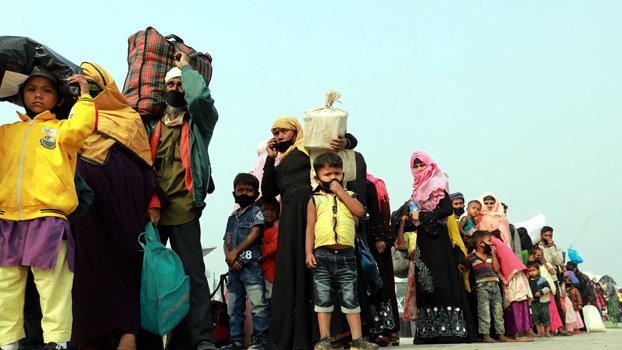Phase-4 Rohingya relocation complete


Tuesday, was the second day of the fourth phase of a relocation programme, in which 1009 Forcibly Displaced Myanmar Nationals, Rohingyas, were taken to Bhasan Char, the island settlement in the Bay of Bengal under Noakhali district.
A total of four ships of the Bangladesh Navy carrying Rohingyas left Patenga Boat Club Jetties in the morning for Bhasan Char.
On Monday and Tuesday a total of 3,020 Rohingyas were brought to Bhasan Char Island, where now the number of Rohingyas is around 11,000.
For Fourth round relocation the Rohingyas were brought to Chattogram from Ukhia, Balukhali and Kutupalong camps in Cox's Bazar on Sunday and Monday.
Rear Admiral Mozamel Haque, Area Commander of Bangladesh Navy of Chattogram said, the Rohingyas voluntarily moved from squeeze refugee camps in Coxs Bazar and they are very much happy with the relocation to a new settlement in Bhasan Char.”
“The arrangement for Rohingyas made by the government in Bhasan Char is very rare in the world”, he said while looking after the relocation process in Boat Club jetties.
While on the way to Bhasan Char, the onboard Rohingyas boys and girls looked on in surprise at the surroundings of Chattogram Port and movement of ships in the Karnphuli River and the adjoining Bay of Bengal.
This time, as in other cases of relocation, on Tuesday many were seen happily showing their surroundings to their relatives through live video calls. Some teen Rohingyas boys and girls were capturing photos and videos.
In the ships, it was seen that most of the Rohingyas happily took the food and drink provided by the navy personnel.
The Rohingyas told reporters at Patenga Boat club jetties that they are moving to Bhasan Char to get rid of the miserable life of the crowded camp in Cox's Bazar.
When boarding the ship with three goats, Mohammad Nur Mohammad, a Rohingya, said government officials had assured them of allowing them to develop a livelihood. For this reason, he was taking cattle with him.
“We are going to Bhasan Char because our relatives who have already gone there are in good condition,” he added.
In Bhasan Char, the government has ensured all kinds of living facilities for Rohingyas. 1009 Rohingyas were brought to Chattogram on Monday.
Out of 1009 Rohingyas, there are 236 male, 287 female and 486 children. Bhasan Char Project Director Commodore Rashed Sattar welcomed them to the island settlement.
All Rohingyas in this phase arrived safely and all arrangements were done for the newly-arrived Rohingyas, Commodore Rashed Sattar said.
Now around 11,000 Rohingya refugees were living in Bhasan Char with the arrangement of the Bangladesh Government. In addition, 307 Rohingya refugees rescued from the sea while illegally entering Malaysia by sea are also staying in Bhasan Char under the same arrangement.
In addition to providing shelter to the Rohingyas, the Navy is also providing them with other necessities.
On December 4, in the First Phase, Rohingyas arrived in Bhasan Char for temporary settlements from camps of Cox’s Bazar
The government has built a shelter project for the Rohingyas at a cost of about TK 3,000 crore in Bhasan Char, where at least 1 lakh Rohingyas can be accommodated.
Various programs have been launched to improve the living standards and livelihood of the Rohingyas who have gone to Bhasan Char In the last three phases. Various government departments including the Rural Development Board BRDB are working for that.
The country's southeastern district of Cox's Bazar has been home to Rohingya since 1991 from neighboring Myanmar's Rakhine state. There are now about 1 million Rohingyas living there, one of the largest refugee infiltrations in history in 2016 and 2017.
Rohingyas living in the world's largest refugee camp are living in a very inhumane environment, from there; the government has taken initiative to relocate them to Bhasan Char to find an easy life.
Although four rounds of Rohingya refugees have come to Bhasan Char, international organizations, including the United Nations, which are providing all the basic humanitarian facilities in Cox's Bazar camps have not started working on Bhasan Char yet.
But a total of 45 local NGOs are working to provide basics including education, school, and recreation.


